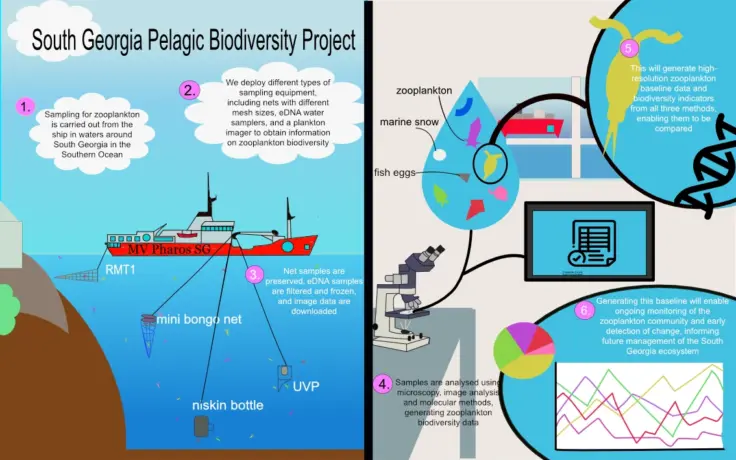South Georgia Pelagic Biodiversity
South Georgia Pelagic Biodiversity
- Start date
- 1 October, 2022
- End date
- 31 August, 2025
 The South Georgia Pelagic Biodiversity project is a Darwin-funded project, led by BAS, and in partnership with the Government of South Georgia and the South Sandwich Islands (GSGSSI) and the Marine Biological Association (MBA). The project is fieldwork-led and is focussed on developing improved tools for the management and monitoring of the South Georgia pelagic ecosystem, through the simultaneous deployment of nets and optical profiler, and the collection of water for eDNA analysis.
The South Georgia Pelagic Biodiversity project is a Darwin-funded project, led by BAS, and in partnership with the Government of South Georgia and the South Sandwich Islands (GSGSSI) and the Marine Biological Association (MBA). The project is fieldwork-led and is focussed on developing improved tools for the management and monitoring of the South Georgia pelagic ecosystem, through the simultaneous deployment of nets and optical profiler, and the collection of water for eDNA analysis.
The zooplankton community of South Georgia is a critical component of the Scotia Sea ecosystem, connecting primary producers, supporting globally important populations of higher predators, and sustaining valuable commercial fisheries. Zooplankton and ichthyoplankton are also key bioindicators of environmental change since they are small, have short life-cycles and respond rapidly to environmental changes. Establishing a pelagic biodiversity baseline at South Georgia is crucial to assess the stability of this system and its response to climate-related changes and species invasions. Whilst routine sampling of the plankton is regularly carried out, analysis is currently limited to a small range of taxa such as euphausiids, fish and Themisto spp. Detailed monitoring of a wider range of taxa, particularly the extremely abundant copepods, is vital if we are to understand and monitor changes to the ecosystem. However, achieving this through net sampling alone is costly and time-consuming, and it can miss important fractions of the plankton community, particularly gelatinous taxa that can be easily damaged in net retrievals.
Through this project, we will address this gap by employing novel image-based and molecular analyses, validated by conventional net sampling. We will analyse historically-collected zooplankton samples both microscopically and optically to construct a baseline and collect reference samples to improve the image classification algorithm. In the field, we will concurrently deploy zooplankton nets, a UVP6 optical profiler, GoFlo bottles to collect water for molecular analysis, and a CTD to collect contextual environmental data. Data generated by all three approaches will be used to develop indices of plankton biodiversity, enabling comparisons of the methods and their applications in understanding and monitoring zooplankton and ichthyoplankton communities.
Results will also feed into the management of the South Georgia and South Sandwich Islands Marine Protected Area (SGSSI MPA) by developing methods that enable the future collection and analysis of key zooplankton and ichthyoplankton biodiversity data, and metrics that will allow the monitoring of under-sampled and invasive taxa.

Outcome
Improved effectiveness of MPA management via development of technical and analytical tools for comprehensive zooplankton biodiversity and non-native species monitoring through three synergistic methods, and input into GSGSSI management activities.
Objectives
1. Creating capacity for higher resolution and more cost-effective zooplankton biodiversity monitoring at South Georgia
2. Acquisition of data on lower trophic level biodiversity and distribution, including zooplankton, ichthyoplankton and non-native taxa or parasites
3. Development of new zooplankton and ichthyoplankton data and bioindicator assessment tools for direct application to monitoring and management
4. Input to SGSSI monitoring and management activities to improve consideration of zooplankton and ichthyoplankton biodiversity and community composition as bioindicators (e.g. differences in species dominance) and to incorporate invasive or non-native species monitoring
5. Publication and dissemination of results
Mark Belchier, GSGSSI
Vicki Foster, GSGSSI
Marianne Wootton, MBA